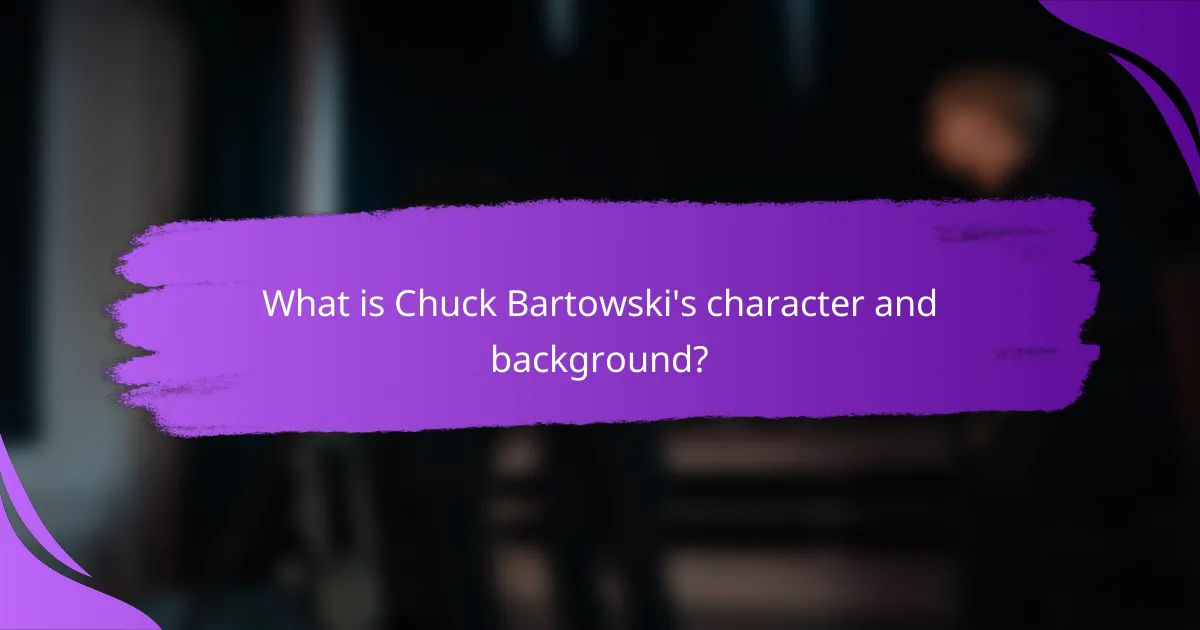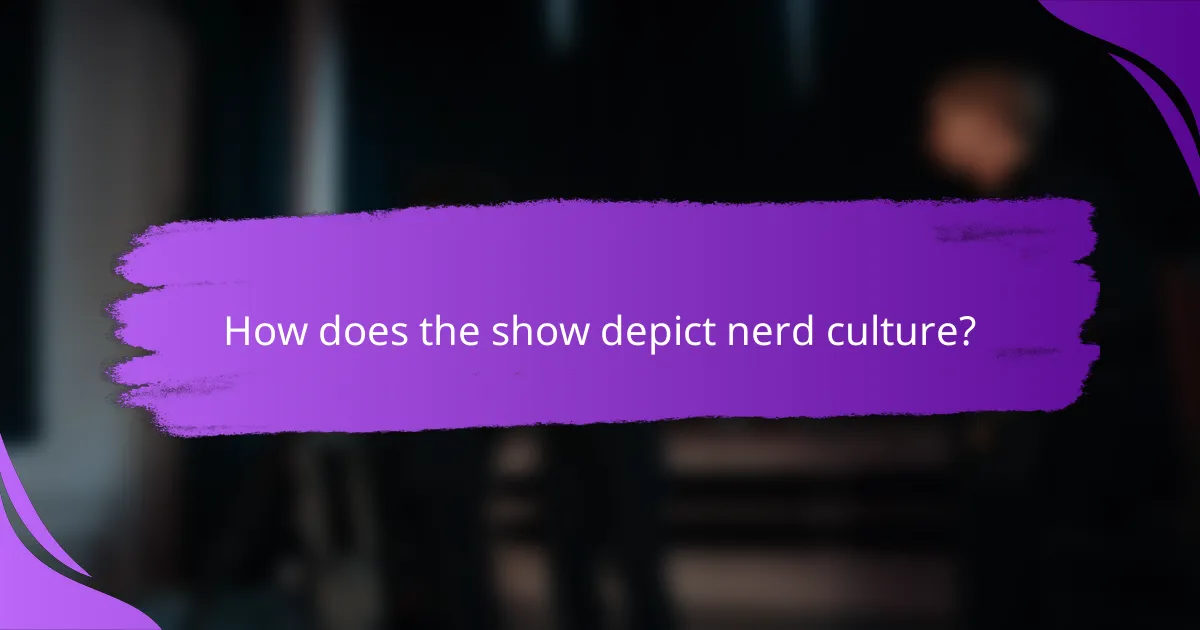Chuck Bartowski is the main character of the television series “Chuck,” where he transitions from an average electronics store employee to an unwitting spy for the CIA and NSA after downloading government secrets into his brain. The series explores themes of friendship, loyalty, and personal growth as Chuck navigates the challenges of espionage while maintaining his relationships. It highlights nerd culture through Chuck’s interests in technology and pop culture, portraying his character as relatable and humorous. Additionally, the show emphasizes the importance of family and the balance between ordinary life and extraordinary circumstances, enriching the narrative with a blend of humor and tension.

What is Chuck Bartowski’s character and background?
Chuck Bartowski is the main character in the television series “Chuck.” He is portrayed as a nerdy, average guy who works at a Buy More electronics store. Chuck’s life changes when he accidentally downloads government secrets into his brain. This event transforms him into an unwitting spy for the CIA and NSA. He struggles with the challenges of espionage while maintaining his personal relationships. Chuck’s character embodies themes of friendship, loyalty, and self-discovery. His background includes a close-knit family and a deep love for technology and pop culture.
How does Chuck’s nerd culture influence his identity?
Chuck’s nerd culture significantly shapes his identity by providing a sense of belonging and self-expression. His passion for technology and video games allows him to connect with like-minded individuals. This connection fosters his confidence and creativity. Chuck’s knowledge of pop culture references becomes a tool for social interactions. It helps him navigate various situations, both in personal and professional settings. Furthermore, his nerdy interests often serve as a coping mechanism during stressful times. They provide an escape and a way to process challenges. Overall, Chuck’s identity is deeply intertwined with his nerd culture, influencing his relationships and decision-making.
What specific traits define Chuck as a nerd?
Chuck is defined as a nerd by his deep interest in technology and pop culture. He frequently engages with video games and comic books. Chuck demonstrates a strong affinity for computer programming and hacking. His social interactions often revolve around nerdy references and discussions. He displays a passion for science fiction and fantasy genres. Chuck’s character embodies the classic traits of intelligence and awkwardness. He often feels out of place in social situations. His close relationships are primarily with fellow nerds, reinforcing his identity.
How do Chuck’s interests shape his relationships?
Chuck’s interests in technology and pop culture significantly shape his relationships. His passion for video games and nerdy hobbies connects him with like-minded friends. This shared interest fosters strong bonds with characters like Morgan and Ellie. Chuck’s enthusiasm for tech also aids his work relationships, especially with his CIA colleagues. His knowledge often becomes a bridge in complex situations. Additionally, these interests help him navigate romantic relationships, particularly with Sarah. Their shared experiences in espionage create deeper emotional connections. Overall, Chuck’s interests serve as a foundation for building and maintaining various relationships in his life.
What are the key elements of Chuck’s espionage adventures?
Chuck’s espionage adventures primarily revolve around his dual life as a spy and a nerd. Key elements include the intersecting worlds of technology and espionage. Chuck’s character is defined by his accidental acquisition of government secrets through a computer. This event catalyzes his transformation from a regular nerd to a reluctant hero.
His adventures often feature a mix of humor and action. The show emphasizes teamwork, as Chuck relies on his fellow agents for support. Relationships play a crucial role in his journey, particularly with Sarah Walker and his family. The narrative frequently explores themes of identity and personal growth. Each mission challenges Chuck to confront his fears and embrace his potential as a spy.
How does Chuck transition from a nerd to a spy?
Chuck transitions from a nerd to a spy when he inadvertently downloads government secrets into his brain. This event occurs when he opens an email containing classified information. The Intersect, a powerful database of intelligence, merges with Chuck’s mind. This transformation forces Chuck into the world of espionage. Initially, he struggles with the skills required for spy work. Over time, he learns to utilize his unique knowledge and skills. His nerdy background provides him with problem-solving abilities. Chuck’s character development showcases his growth from an ordinary tech worker to a capable spy.
What challenges does Chuck face in his dual life?
Chuck faces significant challenges in his dual life as a spy and a regular person. He struggles with the constant threat to his safety due to his espionage activities. Balancing personal relationships becomes difficult as he must keep secrets from friends and family. Chuck experiences stress from the expectations placed on him as a spy. He often encounters moral dilemmas that conflict with his values. Additionally, the pressure to perform under high-stakes situations can lead to anxiety. His dual identity complicates his romantic life, creating tension with partners. Overall, Chuck’s challenges stem from the demands of espionage and the desire for a normal life.

How does the show depict nerd culture?
The show depicts nerd culture through its central character, Chuck Bartowski. Chuck embodies the archetype of a geek who is passionate about technology and video games. His interests often serve as a source of humor and relatability for the audience. The show features numerous references to pop culture, including iconic movies and video games, emphasizing Chuck’s nerdy identity. Characters like Morgan and Ellie further represent various facets of nerd culture, showcasing friendships based on shared interests. The narrative also highlights the contrast between Chuck’s mundane life and the exciting world of espionage. This juxtaposition creates a unique lens through which nerd culture is celebrated and explored. Overall, the show portrays nerd culture as vibrant and integral to the characters’ identities.
What role does humor play in portraying nerd culture in Chuck?
Humor plays a significant role in portraying nerd culture in Chuck. It highlights the quirks and eccentricities of nerds, making them relatable. The show uses comedic elements to showcase the characters’ interests in technology and pop culture. References to video games, comic books, and science fiction create an authentic nerd environment. Chuck’s awkwardness and social blunders are often played for laughs, emphasizing his nerd identity. This humor fosters a sense of community among viewers who share similar interests. Additionally, it contrasts with the espionage elements, adding depth to the narrative. Overall, humor effectively represents and celebrates nerd culture within the series.
How do specific episodes highlight nerd stereotypes?
Specific episodes of “Chuck” highlight nerd stereotypes through character behavior and situational contexts. For instance, Chuck’s obsession with video games and comic books exemplifies the classic nerd trope. In Season 1, Episode 4, Chuck’s knowledge of obscure trivia aids in espionage, showcasing the intelligence often attributed to nerds. Additionally, characters like Morgan display social awkwardness and reliance on technology, further reinforcing these stereotypes. The show’s setting in a tech company emphasizes the nerd culture, portraying characters who prioritize gadgets and geeky interests. These elements collectively illustrate how “Chuck” uses humor and relatable scenarios to depict nerd stereotypes accurately.
What references to geek culture are prevalent in the series?
The series “Chuck” contains numerous references to geek culture. It features iconic video games like “Pac-Man” and “Street Fighter.” The show includes nods to classic movies such as “Star Wars” and “The Breakfast Club.” Comic book culture is represented through characters who are fans of superheroes. Additionally, the series showcases technology and gadgets that appeal to tech enthusiasts. References to popular TV shows and sci-fi elements are also prevalent. These elements create a rich tapestry of geek culture throughout the narrative. The series effectively blends espionage with these cultural references, enhancing its appeal to fans.
How does Chuck connect with other characters through shared interests?
Chuck connects with other characters through shared interests in technology and pop culture. He often bonds with friends over video games and movies. These shared interests create a sense of camaraderie among the characters. For instance, Chuck’s passion for gadgets aligns with his relationships with Morgan and Casey. They engage in discussions about tech and its applications. This common ground helps to strengthen their friendship and teamwork. Additionally, Chuck’s love for nerd culture allows him to connect with characters like Ellie. Their mutual appreciation for comic books and sci-fi further deepens their bond. These interactions highlight how shared interests serve as a foundation for character relationships in the series.
What friendships are formed based on nerd culture?
Friendships formed based on nerd culture often center around shared interests in gaming, comics, and technology. These friendships typically develop in environments like gaming conventions or comic book stores. Individuals bond over mutual fandoms, such as popular franchises like Star Wars or Marvel. Discussions about video games or tabletop games can spark connections between like-minded individuals. Online platforms also facilitate these friendships through forums and social media groups. Such connections may lead to in-person meetups and collaborative projects. Research indicates that shared interests significantly enhance social bonds among individuals in nerd culture communities. This creates a sense of belonging and camaraderie.
How do these connections enhance the storyline?
Connections between characters and plot elements enhance the storyline by creating depth and complexity. These relationships allow for character development, revealing motivations and backstories. For instance, Chuck’s friendships with Morgan and Sarah provide emotional stakes. Their interactions often drive the narrative forward, creating tension and humor. Additionally, connections to pop culture references enrich the viewer’s experience. They provide context and relatability, grounding the espionage elements in everyday life. This blend of personal and professional stakes keeps the audience engaged. Overall, these connections make the storyline more cohesive and impactful.

What themes emerge from Chuck’s adventures?
Chuck’s adventures reveal themes of friendship, loyalty, and personal growth. Friendship is central as Chuck relies on his friends for support during dangerous missions. Loyalty is shown through Chuck’s commitment to his team and romantic interests. Personal growth is evident as Chuck evolves from a nerdy computer technician to a skilled spy. The series also explores the balance between ordinary life and extraordinary circumstances. Chuck’s journey highlights the importance of embracing one’s identity. The theme of family is prominent, showcasing the impact of familial relationships on personal choices. Additionally, the clash between humor and tension enriches the narrative, making it relatable and engaging.
How does Chuck’s character development reflect personal growth?
Chuck’s character development reflects personal growth through his journey from a reluctant hero to a confident leader. Initially, Chuck is depicted as an average nerd with low self-esteem. As he navigates the challenges of espionage, he learns to trust his instincts and abilities. This transformation is evident in his increasing willingness to take risks. For instance, he often steps up to protect his friends and loved ones. His relationships also evolve, showcasing emotional maturity and commitment. Over time, Chuck embraces his role as a spy, demonstrating resilience and adaptability. This growth is underscored by his ability to confront personal fears and insecurities. Ultimately, Chuck’s journey illustrates a profound evolution in self-awareness and responsibility.
What lessons does Chuck learn throughout his journey?
Chuck learns the importance of trust throughout his journey. Trust in his friends and allies becomes essential for survival. He realizes that relying on others can lead to success. Chuck also learns about self-identity and personal growth. He evolves from a nerdy, insecure individual into a capable spy. This transformation highlights the value of stepping out of one’s comfort zone. Additionally, Chuck discovers the significance of sacrifice. He often puts his loved ones’ safety above his own. These lessons shape his character and influence his decisions in critical situations. Overall, Chuck’s experiences teach him resilience and the power of teamwork.
How does Chuck balance his personal and professional life?
Chuck balances his personal and professional life by setting clear boundaries and prioritizing his time. He dedicates specific hours to work and ensures he spends quality moments with family and friends. Chuck often uses humor to diffuse stress, which helps maintain his mental well-being. He also engages in hobbies that provide a creative outlet, contributing to a balanced lifestyle. His relationships, particularly with Sarah, play a crucial role in providing emotional support. This dual focus on work and personal connections enables Chuck to manage the demands of espionage while nurturing his personal life.
What impact does Chuck have on the perception of nerd culture?
Chuck significantly impacts the perception of nerd culture by normalizing and celebrating it. The character embodies traits commonly associated with nerds, such as intelligence and passion for technology. His journey from a regular guy to a hero resonates with audiences. It showcases that nerdy interests can lead to success and adventure. The show blends humor with action, making nerd culture more relatable. This representation has encouraged acceptance and appreciation of nerd culture in mainstream media. The series also highlights the importance of community among nerds, reinforcing positive social connections. Overall, Chuck has contributed to a more inclusive view of nerd culture in popular entertainment.
How has Chuck influenced pop culture representations of nerds?
Chuck has significantly influenced pop culture representations of nerds by portraying them as multifaceted characters. The show presents Chuck Bartowski as a relatable protagonist who transforms from a typical nerd into a hero. This shift challenges stereotypes that often depict nerds as socially inept or one-dimensional.
Chuck’s character embodies intelligence, resourcefulness, and emotional depth, showcasing that nerds can be both competent and charismatic. The series also highlights the importance of friendship and loyalty among nerds, further humanizing them.
Moreover, Chuck’s success in espionage blurs the lines between geekiness and heroism. It encourages a broader acceptance of nerd culture in mainstream media. The show has contributed to a more positive and nuanced portrayal of nerds in subsequent TV shows and films.
What legacy does Chuck leave for future nerd-centric media?
Chuck leaves a significant legacy for future nerd-centric media by blending humor, action, and geek culture. The show popularized the concept of a relatable everyman hero in a tech-savvy world. It showcased the importance of friendship and teamwork in overcoming challenges. Chuck’s integration of pop culture references resonated with audiences, making it a touchstone for nerd identity. The series also highlighted the potential of nerdy characters in mainstream narratives. Its success paved the way for similar shows that embrace geek culture. Chuck’s influence can be seen in subsequent media that prioritize character depth alongside action. The series has become a reference point for creators aiming to capture the nerd demographic.
What practical tips can fans take from Chuck’s experiences?
Fans can take several practical tips from Chuck’s experiences. Embrace your unique skills and interests, as they can lead to unexpected opportunities. Chuck’s journey shows the importance of teamwork. Collaboration often leads to better outcomes than working alone. Additionally, adaptability is key in challenging situations. Chuck frequently adjusted his plans based on new information. Building strong relationships is essential, as seen in Chuck’s connections with friends and allies. Lastly, don’t underestimate the power of humor. Chuck often used humor to diffuse tense situations and connect with others. These tips highlight the value of personal growth, resilience, and social connections in navigating life’s challenges.
The main entity of the article is Chuck Bartowski, the protagonist of the television series “Chuck.” The article explores Chuck’s character development as a nerdy electronics store employee who becomes an unwitting spy after downloading government secrets into his brain. It examines how his nerd culture influences his identity, relationships, and the challenges he faces in balancing his dual life. Key themes include friendship, personal growth, and the portrayal of nerd culture within the series, highlighting its impact on pop culture and future representations of nerds. The article also provides practical lessons derived from Chuck’s experiences, emphasizing the importance of teamwork, adaptability, and humor.